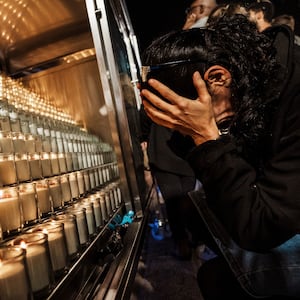KIBBUTZ BE’ERI, Israel—From Kibbutz Be’eri, on the border with Gaza, you can see the horror and cruelty of the Israel-Hamas war in 360 degrees. On one side, you can see the husks of burned houses that are still full of bloodstains and bullet casings from the Hamas massacre of at least 1,200 Israelis on Oct. 7. Then turn around and you watch smoke rising from destroyed buildings during the current bombardment of the Gaza Strip, just a few miles west of the kibbutz. At night, the sky above Gaza glows orange and red with explosions and flares being used to illuminate and destroy targets on the ground, and during the day, you can see the rubble and destruction left behind.
When The Daily Beast visited the once peaceful surroundings of Kibbutz Be’eri the streets were filled with the sights and sounds of war: the screech of jets flying overhead, the crack of outgoing artillery, and the engine roar of armored vehicles. This is part of a military assault on Gaza where, according to the Hamas-run health ministry, Israeli war planes and artillery have killed more than 11,000 people in the Strip. Hamas fighters, alongside innocent men, women, and children have died in their thousands of strikes on refugee camps, apartment buildings, and hospitals. The tactics of the bombing campaign have been condemned as “clearly wrong” by U.N. Secretary-General Antonio Guterres, who said: “The nightmare in Gaza is more than a humanitarian crisis. It is a crisis of humanity” and called for an immediate ceasefire. The Israeli government said the campaign is necessary to root out Hamas.
Be’eri had always lived under the shadow of war, and even before Oct. 7, rocket fire from Gaza could be seen frequently. But the inhabitants lived quiet, calm lives, and many were sympathetic to the plight of Palestinians next door. A good number were peace activists, and sometimes employed Palestinians from Gaza to cross the border and work in the Kibbutzim. Now, the residents have been mostly replaced by heavily armed and uniformed soldiers. There are the remains of crushed and burned-out civilian cars in a carparks, while tanks patrol the grounds just outside.

An Israeli soldier walking through Kibbutz Be’eri and Kibbutz Kfar.
Tom Mutch/Tom Mutch/The Daily Beast
A tank in Kibbutz Be’eri.
Tom Mutch/The Daily BeastIt is impossible to understand the brutality of the Israeli campaign without also knowing the horrific cruelty of the Oct. 7 massacres. Over 120 people were killed in Be’eri alone, variously burned to death, blown up with grenades, or shot execution-style. “The first thing that hits you is the smell of bodies,” Simcha Greinman, a member of Zaka, an emergency response team that was responsible for retrieving the bodies and cataloging the death, told The Daily Beast. While standing in front of the charred remnant of a house in Kfar Aza, another destroyed kibbutz, he recalled “we walked into the back room, and saw five members of a family, two children, the parents and a grandmother who lived together. They were in a circle, hugging each other… burned to the bone.” He started to choke and seemed to hold back tears as he continued: “Our job is to take the bodies and put them into bags. You’re taking this circle they had, last moments of life, and taking them apart, laying them down, and putting them into a bag. Looking out of the room you can still see a birthday cake. It’s mind-boggling, what kind of human being could do such a thing?”

Damaged buildings in Kibbutz Be’eri and Kibbutz Kfar Aza.
Tom Mutch/The Daily Beast
A toy bear in a damaged building in Kibbutz Be’eri and Kibbutz Kfa.
Tom Mutch/The Daily BeastThroughout Israel, the trauma of these attacks has already left deep scars in the national psyche. Almost everyone The Daily Beast spoke with in Israel is connected to someone who was killed, wounded, or taken to Gaza as a hostage.
It is these horrors that have led to such an overwhelming Israeli response. “People outside Israel don’t understand the deeply embedded trauma inside Jewish people, it has reawakened the fear that we could be exterminated,” says Uriel Zimmerman, who worked with the Jerusalem authorities on Oct. 7 fielding calls from relatives and friends who couldn’t contact their loved ones. “It is important to understand both sides as recovering from trauma, nothing here is helping the situation. How can you behave logically when all you are doing is reacting and surviving?”

A protestor in Israel.
Tom Mutch/The Daily BeastYet despite the shared suffering, Benjamin Netanyahu’s government has come under withering criticism for its failure to prevent the attack. Polls overwhelmingly show that most citizens of Israel across the spectrum believe he should step down either now or after the war is over. Most Israelis support the assault on Gaza, but even within Israel there are those who believe it is doing more harm than good. Last week, hundreds of protesters gathered outside the Knesset, Israel’s parliament, to call for the return of the 241 known Israeli hostages and pressure the government to do more to ensure their safe return. Marking 30 days since the massacres, they lit candles and held placards bearing slogans, the most prominent being ‘Bring Them Home NOW!’. This slogan is frequently seen throughout Israel on posters, T-shirts, and pendants.
Maoz Inon, a businessman and peace activist, told me in an interview outside the Knesset, “My parents were killed on Oct. 7 in the early morning, among the first victims of the Hamas attack. Since then, it has been a month of sorrow and agony, and I’m almost drowning in this ocean of pain.” He tells me that he has been galvanizing his pain from the attack on Kibbutz Netiv HaAsara, where his parents died, into action. “From the moment my parents were killed I’m on a mission. And that mission is divided into goals. The first goal is to bring home those who were kidnapped and held hostage in Gaza by Hamas. My second goal is an immediate ceasefire and end to the war. Because the war is only serving Hamas and Benjamin Netanyahu. As the war goes on, he will get support from our politicians and from world leaders, this is his strategy.” Several times the crowd chanted “Lekh! Lekh!” the Hebrew word for “Go!”

Maoz Inon, an Israeli businessman and peace activist, outside the Knesset.
Tom Mutch/The Daily BeastSome of those calls even come from people with connections to the kibbutzim. Itamar Avneri, a co-founder of the Standing Together movement for Jewish-Arab solidarity within Israel, is a previous resident of Kibbutz Be’eri. Even though he left several years ago, he said, “I am haunted by dreams and thoughts about Be’eri. I still have friends in Be’eri, I know at least one woman who was kidnapped into Gaza.” Despite this, he believes that the bombing campaign is counterproductive. “Many Israeli Jews are afraid, and I am afraid as well, many are angry, and I am very angry. Many people want revenge and I understand why, though I do not seek revenge… but there is no military solution to this overall situation. I cannot see how the war is going to get rid of Hamas, just continue this terrible cycle of violence.”
The only solution he sees to the violence is a belated return to the negotiating table. “We need Israeli-Palestinian peace, and we have to work very hard for it… but I believe that. In their heart of hearts all Israelis and all Palestinians apart from the most extremist groups in both societies, know that millions of Palestinians, and millions of the Jewish people, are not going anywhere… we have to find a way to live together, in peace. And when have that kind of agreement that kind of peace, we will be shocked how easy it was and we will ask ourselves what the fuck we were doing all those years. Why didn’t it happen twenty years ago?”







